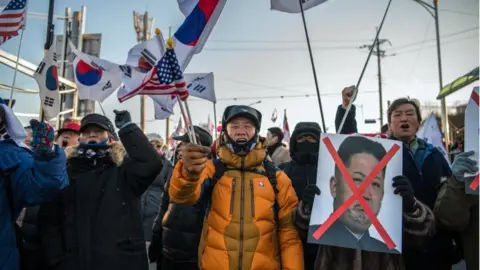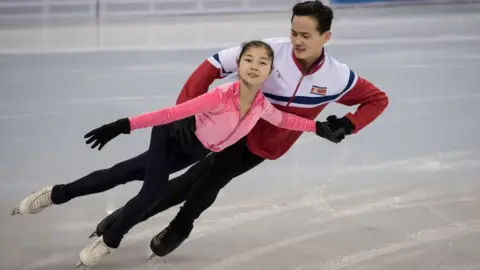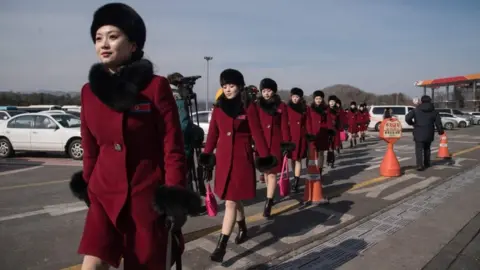North Korea got what it wanted from the Winter Olympics
 Getty Images
Getty ImagesSport has always been a highly political affair for North Korea and this Winter Olympics has proved to be no exception. But sports diplomacy expert Jung Woo Lee says North Korea will enter this Games feeling like its image has been burnished - at least to its own people.
The Pyeongchang 2018 Winter Olympics is getting underway and already the state of relations between North and South Korea is dominating the narrative about the Games. That in itself is a small victory for Pyongyang.
North Korean leader Kim Jung-un uses sport as a propaganda device more actively than his father and grandfather, and so it should be no surprise that he used his New Year message to raise the prospect of Olympic attendance.
It was certainly a positive signal, given the escalating political and military tensions surrounding the Korean peninsula. But by no means was this seemingly peaceful gesture a free offer.
By negotiating with South Korea and the International Olympic Committee (IOC), the North Koreans got what they wanted. Originally only two of their athletes qualified for the competition on sporting merit alone - and skating pair Ryom Tae-Ok and Kim Ju-Sik were set to miss out after missing the registration deadline.
But after a hastily arranged series of meetings, the two Koreas eventually agreed to march together, bearing the united Korean flag, and to field a unified women's ice hockey team. Twenty-two North Korean athletes were due travel to the games, after extra spaces were given to North Korean skiers in negotiations. It is now sending its largest winter delegation ever to the South Korean venue.
And these athletes are key to the North's propaganda offensive. Time and time again they pour adulation on their Dear Leader when they win at international events. State media relay these emotive moments to the people back home. It shows North Korea winning on an international stage and that is channelled directly back.
 AFP
AFPThe fact that skiers were afforded places is also no coincidence.
North Korea opened the huge Masikryong ski resort in December 2013, after building it at breakneck speed. It has become a symbol of national pride and a significant propaganda tool for the nation - "Masikryong speed" has become a political slogan to overcome hardships the country is facing.
So seeing their countrymen attain "Masikryong speed" will be something to transmit to North Koreans - they may leave out the bit where they don't win the medals.
But the North's participation in the Winter Olympics is not entirely a propaganda initiative. The sports extravaganza does also function as an initial contact point between the two sides, meaning they reopened a diplomatic channel with South Korea after an almost two-year hiatus.
Their collaboration and demonstration of unity at the Olympic Games may pave the way for further cultural and humanitarian exchanges between the two sides.
 AFP/Getty
AFP/GettyOn Wednesday, North Korea announced that Kim Yo-jong, a senior politburo official and Kim Jong-Un's sister, will attend the opening ceremony. If she comes, it will be the first visit to the south by a member of North Korea's ruling family since the country's partition.
Dispatching such top-level delegations from Pyongyang to Pyeongchang could imply the willingness of the North to improve its relations with the South.
Kim Jong-un may well use these winter games as yet another propaganda show to sustain his regime, but at the same time Pyeongchang 2018 offers a unique initiative for both sides to repair their relations, too.
The famed "hotline" connecting the nations has also been reopened through the games, which can only be seen as a positive development.
Who knows what might have happened if there had been no Winter Olympics in South Korea? But, for now, North Korea gets its athletes on an international stage, a lot of headlines, and a temporary rapprochement with the South.
Dr Jung Woo Lee is Lecturer in sport policy at the University of Edinburgh. He is also the founding member of Edinburgh Critical Studies in Sport research group. He recently published (with two co-editors) an edited volume of Routledge Handbook of Sport and Politics.
